Clash in the Pacific: New Zealand Demands Notice, China Asserts Power
China’s expanding presence challenges New Zealand’s expectations of diplomatic protocol and regional influence.
Cultural dimensions shape how nations approach security, sovereignty, and international relations in the Pacific.
What's Happening
New Zealand's Peters meets with Chinese counterpart
Asks China for early notice on naval drills
Peters raises concerns over Cook Islands deals
China says it respects New Zealand's ties with Pacific island countries
Striking cultural differences reveal themselves in how these nations approach military activities and regional influence.
New Zealand's Deputy Prime Minister, Winston Peters, directly challenges China's failure to provide proper notification of naval drills, calling it "a failure in our special relationship."
Foreign Minister of the People's Republic of China, China's Wang Y,i responds with talk of becoming "partners of mutual trust."
This fundamental disconnect stems from different cultural approaches to power dynamics, rule systems, and environmental control.
Should international relations follow established protocols or adapt to the strategic interests of powerful nations? It all depends on your Cultural Perspective.
Why It Matters
These cultural differences matter because they're reshaping the security landscape of the entire Pacific region.
New Zealand's culture demonstrates a rules-based approach. They expect equal treatment despite power differences. They want to maintain control through established protocols.
China's culture shows comfort with power imbalances. They're flexible with rules and strategically expand their influence to shape their environment.
The gap becomes clear when Peters directly calls for "early notice on naval drills" while China responds vaguely about "resolving differences through dialogue."
Such disconnects threaten regional stability when smaller nations expect consultation while larger powers act on their own.
The division grows deeper when China forms a "comprehensive strategic partnership" with the Cook Islands despite New Zealand's constitutional relationship with them.
This shows how power dynamics can override formal arrangements.
Neither culture's approach is superior—they simply reflect different positions in global power structures and different histories with international relations.
What It Means
First, how each country tries to control its environment shapes their approach to regional influence.
New Zealand's culture seeks to control outcomes through diplomatic assertiveness. Peters explicitly states that notification failures should be "corrected into the future." He insists China "needs to understand the constitutional arrangement" between New Zealand and the Cook Islands.
China's culture shows determination to shape its surroundings through strategic expansion. Their unannounced military exercises and wide-ranging agreements with Pacific nations demonstrate this approach.
This creates friction when New Zealand tries to maintain its influence while China systematically expands throughout the Pacific.
The conflict intensifies as China builds relationships directly with nations like the Cook Islands, bypassing traditional power structures.
Second, different approaches to power and hierarchy create significant tensions.
New Zealand's culture expects consultation regardless of nation size or strength. Peters' direct raising of concerns with Chinese leaders shows expectations of fair treatment despite China's larger size and influence.
China's culture accepts hierarchical relationships between nations. Their minimal notification before military exercises near smaller nations' territories shows comfort with power differences in international relations.
This difference creates conflict when China conducts "live-fire exercises in international waters" with "little notice," forcing commercial airlines to change routes. New Zealand expects equal respect while China operates from a position of advantage.
Third, how each nation views international obligations fundamentally affects their actions.
New Zealand's culture expects everyone to follow standard protocols. Peters' concern that Pacific Island nations received "no warning at all" about missile tests shows belief in universal notification standards.
China's more flexible approach allows adjustments based on strategic interests. Their selective notification and tailored agreements with individual Pacific nations show adaptation to specific circumstances rather than following universal rules.
This clash becomes evident when New Zealand expresses alarm over China's agreements with the Cook Islands spanning multiple areas—from education and fisheries to disaster management—without respecting the existing constitutional framework.
What's Next
These cultural divides will persist as China continues expanding its influence throughout the Pacific.
Tension will grow between New Zealand's expectation of consultation and China's independent approach to military activities. Without addressing notification protocols, future naval exercises will likely create additional diplomatic problems.
Power dynamics will continue shaping regional relationships.
Smaller Pacific nations will increasingly navigate between maintaining traditional ties with countries like New Zealand while responding to China's growing economic and military presence.
Communication approaches need significant improvement to avoid misunderstandings.
New Zealand's direct diplomatic style may need to acknowledge China's more relationship-focused approach.
China would benefit from recognizing how its actions appear to nations with different cultural frameworks.
Success requires recognition of these cultural differences from both sides.
China needs to understand why proper notification matters to countries like New Zealand. New Zealand must recognize China's strategic interests in the Pacific won't diminish.
The future stability of Pacific relationships depends on developing protocols that respect both New Zealand's need for procedural fairness and China's expanding regional role.
Without addressing these fundamental cultural differences, even minor military exercises or diplomatic agreements will continue triggering outsized tensions.





